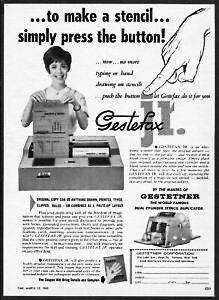Difference between revisions of "E-stenciller"
| Line 1: | Line 1: | ||
| − | Fannish abbreviation for an electronic stencil cutter, also called an electrostenciller, a machine for cutting special plastic [[mimeo]] | + | [[File:Gestefax.jpeg|frameless|right]] |
| + | [[Fannish]] abbreviation for an electronic [[stencil]] cutter, also called an '''electrostenciller''', a machine for cutting special plastic [[mimeo]] stencils, which enabled the user to print illustrations with heavy dark areas or even [[photographs]]. Brand names included [[Gestetner]]’s '''Gestefax''' and '''Stenofax'''. | ||
| − | The illustrations (or screened photos) and the e-stencil are placed side by side on the | + | The illustrations (or screened photos) and the e-stencil are placed side by side on the drum of the device. When turned on, the drum would turn; a photoelectric scanner would move from left to right, slowly scanning the illustration/photo, and every time it "saw" a black area the [[stylus]] burned through the corresponding spot on the stencil. |
| − | + | [[Hal Shapiro]] introduced e-stencilling to [[fandom]] with ''[[Ice (Shapiro)]]'', the [[fanzine]] he [[pubbed]] while in the Air Force in the early 1950s, according to [[Ted White]] in a long [[article]] about the process in ''[[Silme]]'' 2 ([https://fanac.org/fanzines/Silme/Silme02.pdf August 1962, p. 13]). | |
| − | {{publishing}} | + | When [[fans]] first started using e-stencillers, they would usually pack as many [[illos]] as they could on a white legal-sized surface, which they would have cut by a professional service; they would then slice the e-stencil into parts, and use stencil cement to put the [[art]] in the proper place on a typed wax stencil on which corresponding holes had been cut away. |
| + | |||
| + | The cost of a single e-stencil ranged from $5 to $10 when a commercial service was used. Over the years, some [[fans]] bought their own machines and special [[stencils]], and when the per-[[stencil]] cost dropped to around $1-$2, many of them simply e-stenciled entire pages of type and illustrations together. | ||
| + | |||
| + | |||
| + | {{publishing|start=1950s}} | ||
| + | [[Category:fanspeak]] | ||
Latest revision as of 00:24, 7 April 2023
Fannish abbreviation for an electronic stencil cutter, also called an electrostenciller, a machine for cutting special plastic mimeo stencils, which enabled the user to print illustrations with heavy dark areas or even photographs. Brand names included Gestetner’s Gestefax and Stenofax.
The illustrations (or screened photos) and the e-stencil are placed side by side on the drum of the device. When turned on, the drum would turn; a photoelectric scanner would move from left to right, slowly scanning the illustration/photo, and every time it "saw" a black area the stylus burned through the corresponding spot on the stencil.
Hal Shapiro introduced e-stencilling to fandom with Ice, the fanzine he pubbed while in the Air Force in the early 1950s, according to Ted White in a long article about the process in Silmé 2 (August 1962, p. 13).
When fans first started using e-stencillers, they would usually pack as many illos as they could on a white legal-sized surface, which they would have cut by a professional service; they would then slice the e-stencil into parts, and use stencil cement to put the art in the proper place on a typed wax stencil on which corresponding holes had been cut away.
The cost of a single e-stencil ranged from $5 to $10 when a commercial service was used. Over the years, some fans bought their own machines and special stencils, and when the per-stencil cost dropped to around $1-$2, many of them simply e-stenciled entire pages of type and illustrations together.
| Publishing | 1950s— |
